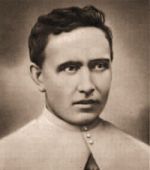Catholic World News News Feature
Pope Benedict's challenge to Africa March 23, 2009
Pope Benedict XVI concluded a week-long visit to Africa on March 23, after celebrating Mass for a congregation of nearly 1 million the previous day, and underlining his message that Africa, for all its problems is "the continent of hope."
The Pontiff left de Fevereiro airport outside Luanda, Angola, on Monday morning on his return flight to Rome. In his farewell remarks before board the plane, the Pope said that he was pleased to have "found the Church here to be so alive and full of enthusiasm, despite the difficulties, able to take up its own cross and that of others, bearing witness before everyone to the saving power of the Gospel message."
The Pope-- who was escorted to his flight by Angola's President Eduardo dos Santos and other civic and religious leaders-- did not fail to mention the suffering of Africa during his final remarks. "Our hearts cannot be at peace as long as there are brothers that suffer the lack of food, work, a house, and other fundamental goods," he said.
Pope Benedict had been clear, throughout his African journey, in speaking about the enormous difficulties faced by the people of that continent. In his homily during an outdoor Mass that drew hundreds of thousands of people in Luanda on Laetare Sunday, the Pope summarized those problems:
We think of the evil of war, the murderous fruits of tribalism and ethnic rivalry, the greed which corrupts men's hearts, enslaves the poor, and robs future generations of the resources they need to create a more equitable and just society -- a society truly and authentically African in its genius and values. And what of that insidious spirit of selfishness which closes individuals in upon themselves, breaks up families, and, by supplanting the great ideals of generosity and self-sacrifice, inevitably leads to hedonism, the escape into false utopias through drug use, sexual irresponsibility, the weakening of the marriage bond and the break-up of families, and the pressure to destroy innocent human life through abortion?
Although public discussion of the Pope's remarks on AIDS and condoms had dominated media coverage of his trip in the Western world, the Pontiff had also delivered very sharp messages on other issues. In Angola he twice denounced corruption in government: an extremely pointed message considering the complaints that President dos Santos has been charged with rigging the country's elections. He also spoke against dangerous powers of extreme religious sects and the lingering influence of witch doctors, with the result that many poor people "are living in fear of spirits, of malign and threatening powers. In their bewilderment they end up even condemning street children and the elderly as alleged sorcerers."
However the Pope was equally insistent in repeating his thematic message for the trip: that Africa is the "continent of hope." On Sunday, March 23, as he prayed the Angelus after celebrating Mass in Luanda, the Pope balanced his message with a reference to "this great Continent so filled with hope, yet so thirsty for justice, for peace, for a sound and integral development that can ensure a future of progress and peace for its people."
During his homily at that Sunday Mass the Pope spoke with sympathy about Angola's long and bloody civil war, and the difficult recovery from years of conflict. "This experience is all too familiar to Africa as a whole," he said; "the destructive power of civil strife, the descent into a maelstrom of hatred and revenge, the squandering of the efforts of generations of good people." He pointed out that the day, March 22, had been established as "a day of prayer and sacrifice for national reconciliation" in Angola.
More broadly, the Pope pointed out, the cause of peace and reconciliation is the cause of the Catholic Church in Africa. He reminded the congregation in Luanda that the 2nd African Synod, which will be held in Rome in October, has chosen as its theme: "The for Africa of the Synod of Bishops, which will be devoted to the theme: The Church in Africa in Service to Reconciliation, Justice and Peace."
Pope Benedict traveled to Africa for the formal release of the working document, or instrumentum laboris, for the October Synod meeting. But he also made the trip to encourage the Catholics of Africa in their mission of evangelization and service to society. Throughout the trip, in each public appearance, the Holy Father asked the faithful of Africa to act as leaven in their society, and ensure that Africa does indeed become "the continent of hope."
In his Sunday homily the Pope reminded his people that the Christian faith provides the best-- in fact the only reliable-- source of hope. Pope Benedict observed that in the Gospel reading for the day, Jesus makes a "quite striking" observation: "He tells us that God's sentence has already been pronounced upon this world (Jn 3:19). The light has already come into the world." The Pope challenged the Catholic people of Africa to bring that light to bear upon their own societies.






